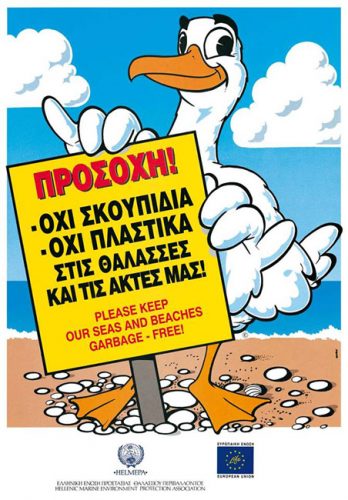“Verily, a polluted stream is man. One must be a sea, to receive a polluted stream without becoming impure.” Thus Spake Zarathustra: 3, F. Nietzsche
Our times are such, that even the sea is not vast enough to withstand “man’s” polluted stream without becoming impure.
In the 1990s, this bold but friendly seagull [pictured here] advised Greeks not to leave rubbish in the sea and coasts. For some reason he doesn’t seem to be trendy any more. Even if there is less visible pollution on our beaches, the problem is growing. Advanced societies have a plurality of choices on how and what to consume, and correspondingly, how to dispose of waste. But even Germany, the world’s top recycler, has achieved a recycling rate of only 56.1% (Italy’s is 49%, the UK’s: 43.7 %!) despite the education provided and the infrastructure in place.
So how can we expect developing countries to confront the problem of waste, particularly plastic on shores and in seas? 544 million kilograms of plastic each year are dumped into the river Ganges, India, and its tributaries. It is said to be the biggest source of plastic waste that pollutes the world’s oceans. The cause of the problem there could be three-fold: Firstly, low living standards which must be addressed before [environmental] education can be addressed; Secondly, a government reluctant to act. The Indian government pledged $3 million to clean up the Ganges, but it remains unspent; thirdly, the cultural significance of the Ganges—‘Ganga Mata’ is worshipped as a divine mother—this status means that it is unlikely that rules and regulations can be imposed in relation to it, even if the goal behind them would be to conserve it.
Therefore, Europe can set as many recycling targets as it pleases, but the issue is wider and demands a spherical approach. What is to be done?
Alex Bellini is an explorer who will sail from the Ganges to the Pacific alone in a self-made raft. Bellini’s aim is to “stir the world’s conscience” and because “we are the only responsible for this situation” as he claims in this video.
Plastic waste doesn’t stay in the Ganges. It makes the same long journey, floating its way to the ‘Great Pacific Garbage Patch’, halfway between Hawaii and California, roughly spanning an area larger than Spain and Portugal put together.
Given the extent of the problem, and given the obstacles to the developed world in curbing it, the least we can do in the Occident, where we have a choice, is to follow relatively easy steps for reducing ocean plastic pollution: to limit the use of one-use plastics and use alternatives like a flask, to recycle properly, participate or instigate riverside/beach clean ups, and spread the word. Reducing plastic waste is not a trend, and we should not need a cartoon seagull to recognise how pertinent it is.
First published in “Polis” magazine; Campagna, Italy, Dec. 2018.
